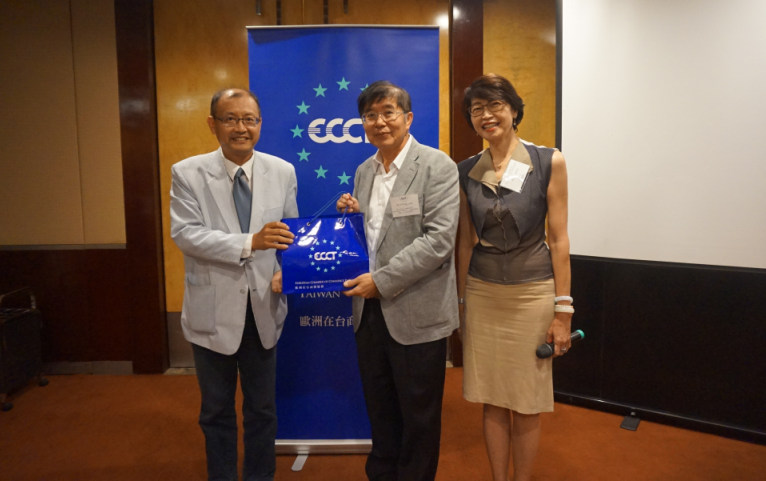Lunch with the NHIA Director-General

On 23 August the ECCT's Pharmaceutical, Medical Device and Healthcare Enhancement committees jointly hosted a lunch with guest speaker Dr Lee Po-chang, Director-General of the National Health Insurance Administration under the Ministry of Health and Welfare (MoHW). Dr Lee gave an overview of the challenges facing Taiwan's healthcare system and some of ways to address them.
Like all healthcare authorities globally, Taiwan authorities are facing the challenges of caring for a growing number of patients, given the aging population, rising instances of chronic non-communicable diseases and limited budgets. In terms of Taiwan's own particular challenges, the lack of integrated information has led to an inefficient use of resources. This is one of the problems that authorities have been working hard to address in recent years through initiatives such as the health cloud. By sharing information, health care providers can reduce duplication of tests and prescriptions and thereby reduce costs as well as offer better treatment to patients.
One of President Tsai's priorities, outlined in her policy white paper, is to make sure that everyone, even those who are unable to pay, have health coverage. For this reason, Lee said that one of his first tasks when he took office was to "unlock" the health insurance cards of users who had previously been unable to use their cards because they had not paid insurance premiums.
The second priority is to improve the working environment and conditions for medical personnel. Lee said that by opening up data on things like nurse-to-patient ratios and actually naming hospitals where the shortage of nurses is the worst, is a big improvement from past practice, since it makes it easier to allocate resources where they are most needed.
Another area where improvement could be made is to integrate and make the best use of all healthcare service providers, especially clinics, which tend to be under-utilised, compared to large hospitals. Lee said that he hoped to improve the integration of all resources, encourage cooperation between hospitals and clinics and encourage patients to use clinics. However, he stressed that it very important for clinics to work harder to prove their worth by providing a high quality of care to patients, which is the only way to increase trust and encourage patients to use their services.
The purpose of the NHIA's Health Bank, which was introduced in 2014, is to help patients to manage their own health. The health cloud was introduced in 2013 to guarantee patient safety from repeatedly being prescribed the same medicine. My Health Bank has been available online since July 2016. Users just need to register online to use it. There is no need for a separate health card. The system uses graphs to make it easier for patients to read and interpret their records. Information is kept for the past three years. Patients can check information on medicines that have been prescribed, medicines they are allergic to, information about previous check-ups and surgeries in the cloud. In addition, it also provides reminders to patients if they need check-ups or information about their conditions. It also allows parents to keep track of the records of their children.
Statistics show that medicines for high blood pressure, high lipids and high blood sugar decreased between 2014 and 2015, thanks to better record keeping and sharing in the health bank.
In September this year a virtual private network platform for medical professionals will be set up to facilitate communication among professionals and also with healthcare authorities.
Lee acknowledged that good quality medicine is not cheap but the real price of medicine is not transparent. One problem which he admitted will be difficult to solve is the so-called price gap.
There is also the problem of paying for expensive new drugs. For example, there are new oral medicines for hepatitis available but they are expensive. Pricing levels have not yet been set and are still being discussed. He noted that different countries have different ways to cover the costs of medicine. Japan, for example, has a large number of Hepatitis C sufferers (1.5 million). National health only covers 30% of costs of the drugs in Japan as well as South Korea. Since new medicines are expensive and resources are limited, it may be necessary for patients to be asked to pay a portion of the costs in order to reduce the burden on the NHIA. However, Lee said that he would approach this idea with caution given that there is no public consensus in Taiwan on the idea of patients paying for medicine.
Lee emphasized the need for humility and communication. He concluded by expressing the wish for the NHIA to continue to work in partnership with the healthcare industry.
